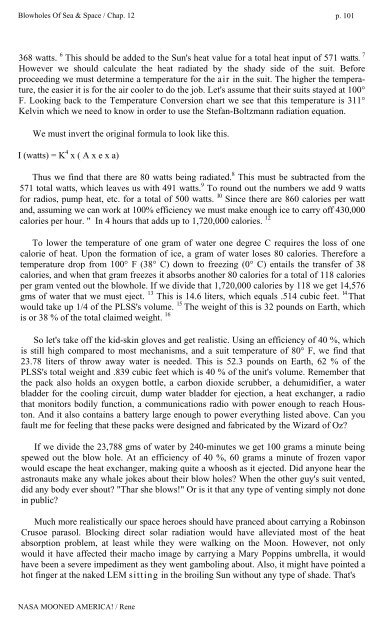Rene-NASA-Mooned-America
Rene-NASA-Mooned-America
Rene-NASA-Mooned-America
You also want an ePaper? Increase the reach of your titles
YUMPU automatically turns print PDFs into web optimized ePapers that Google loves.
Blowholes Of Sea & Space / Chap. 12 p. 101<br />
368 watts. 6 This should be added to the Sun's heat value for a total heat input of 571 watts. 7<br />
However we should calculate the heat radiated by the shady side of the suit. Before<br />
proceeding we must determine a temperature for the air in the suit. The higher the temperature,<br />
the easier it is for the air cooler to do the job. Let's assume that their suits stayed at 100°<br />
F. Looking back to the Temperature Conversion chart we see that this temperature is 311°<br />
Kelvin which we need to know in order to use the Stefan-Boltzmann radiation equation.<br />
We must invert the original formula to look like this.<br />
I (watts) = K 4 x ( A x e x a)<br />
Thus we find that there are 80 watts being radiated. 8 This must be subtracted from the<br />
571 total watts, which leaves us with 491 watts. 9 To round out the numbers we add 9 watts<br />
for radios, pump heat, etc. for a total of 500 watts. I0 Since there are 860 calories per watt<br />
and, assuming we can work at 100% efficiency we must make enough ice to carry off 430,000<br />
calories per hour. " In 4 hours that adds up to 1,720,000 calories. 12<br />
To lower the temperature of one gram of water one degree C requires the loss of one<br />
calorie of heat. Upon the formation of ice, a gram of water loses 80 calories. Therefore a<br />
temperature drop from 100° F (38° C) down to freezing (0° C) entails the transfer of 38<br />
calories, and when that gram freezes it absorbs another 80 calories for a total of 118 calories<br />
per gram vented out the blowhole. If we divide that 1,720,000 calories by 118 we get 14,576<br />
gms of water that we must eject. 13 This is 14.6 liters, which equals .514 cubic feet. 14 That<br />
would take up 1/4 of the PLSS's volume. 15 The weight of this is 32 pounds on Earth, which<br />
is or 38 % of the total claimed weight. 16<br />
So let's take off the kid-skin gloves and get realistic. Using an efficiency of 40 %, which<br />
is still high compared to most mechanisms, and a suit temperature of 80° F, we find that<br />
23.78 liters of throw away water is needed. This is 52.3 pounds on Earth, 62 % of the<br />
PLSS's total weight and .839 cubic feet which is 40 % of the unit's volume. Remember that<br />
the pack also holds an oxygen bottle, a carbon dioxide scrubber, a dehumidifier, a water<br />
bladder for the cooling circuit, dump water bladder for ejection, a heat exchanger, a radio<br />
that monitors bodily function, a communications radio with power enough to reach Houston.<br />
And it also contains a battery large enough to power everything listed above. Can you<br />
fault me for feeling that these packs were designed and fabricated by the Wizard of Oz<br />
If we divide the 23,788 gms of water by 240-minutes we get 100 grams a minute being<br />
spewed out the blow hole. At an efficiency of 40 %, 60 grams a minute of frozen vapor<br />
would escape the heat exchanger, making quite a whoosh as it ejected. Did anyone hear the<br />
astronauts make any whale jokes about their blow holes When the other guy's suit vented,<br />
did any body ever shout "Thar she blows!" Or is it that any type of venting simply not done<br />
in public<br />
Much more realistically our space heroes should have pranced about carrying a Robinson<br />
Crusoe parasol. Blocking direct solar radiation would have alleviated most of the heat<br />
absorption problem, at least while they were walking on the Moon. However, not only<br />
would it have affected their macho image by carrying a Mary Poppins umbrella, it would<br />
have been a severe impediment as they went gamboling about. Also, it might have pointed a<br />
hot finger at the naked LEM sitting in the broiling Sun without any type of shade. That's<br />
<strong>NASA</strong> MOONED AMERICA! / <strong>Rene</strong>


